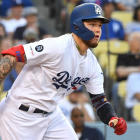On Sunday, the Boston Red Sox agreed to terms on a modified trade that sent Mookie Betts, David Price, and substantive cash considerations to the Los Angeles Dodgers, pending medical review. In return, the Red Sox acquired outfielder Alex Verdugo, infielder Jeter Downs, and catcher Connor Wong from the Dodgers. (In the original version of the deal, the Red Sox landed right-handed pitcher Brusdar Graterol from the Minnesota Twins in addition to Verdugo.)
It's always hard to extract equal value for a player of Betts' caliber, and it's even more difficult when the league knows your owner wants to clear salary to avoid trifling luxury-tax penalties. While general manager Chaim Bloom is used to operating under similar, if lower-stakes circumstances with the Tampa Bay Rays, this deal does not appear to be the exception. Rather, the Red Sox received an underwhelming return for what amounts to the second best player in baseball, an above-average veteran starter, and a considerable amount of money.
What exactly did the Red Sox get in return? Let's take a look.

Verdugo, who will turn 24 come May, is the veteran in Boston's return. He appeared in 158 games over parts of three seasons with the Dodgers, hitting .282/.335/.449 (107 OPS+) and accumulating 3.2 Wins Above Replacement, according to Baseball-Reference's calculations.
Verdugo has shown an appreciable talent for putting the bat on the ball, as he struck out in just 13 percent of his plate appearances last season. He isn't making contact for the sake of making contact, either. He posted an above-average exit velocity last season, and his ISO was in line with other well-regarded corner outfielders, such as David Peralta and Tommy Pham. Verdugo is a candidate to trade contact for power, but it's to be seen if the Red Sox will encourage him to make that swap over the coming years (he's under team control through 2024).
In addition to profiling as an above-average hitter, Verdugo is a quality fielder with a big-time arm. He should remain an asset in a corner.
Verdugo has the potential to be a good two-way contributor, and perhaps more than that if he can tap into his raw strength. There is a catch, though, as teams have been concerned about his makeup since his amateur days. Some clubs removed him from their draft boards then, and others have told CBS Sports they would not acquire him even now. There's a good deal more risk here than there would normally be with a player of his age, production, and upside.
Downs, 21, reached Double-A last season in his first year with the Dodgers. (He'd been part of the winter deal with the Cincinnati Reds that also included Yasiel Puig and Alex Wood, among others.) We named him the Dodgers' 2020 contributor in our report on their farm system. Here's what we wrote:
Jeter Downs, also acquired in the Puig trade, hit .276/.362/.526 with 24 home runs and 24 stolen bases (on 32 tries) across High- and Double-A. Not bad for a 20-year-old. Downs remains a shortstop for now, but the expectation is that he'll end up moving to second base, or perhaps even the outfield. His bat should play wherever he lands -- and he figures to debut late in the season.
It should be noted that Downs lacks a carrying tool -- or, in English, a high-grade component to his game. Rather, he does a little bit of everything without doing anything especially well. Depending on one's perspective, that either makes him an underrated prospect (in the sense that his sum is greater than his parts) or a riskier one (in that he has little to fall back on if his bat doesn't translate in whole). Dealer's choice.
Wong ended last season with a supercharged 40-game Double-A stint that saw him hit .349/.393/.604 with nine home runs. He's a good athlete whom the Dodgers entrusted with cross-training at other positions. In 2019, he caught 83 times and played second or third on 26 other occasions. The Red Sox will presumably allow him to continue his Austin Barnes impersonation, as it'll make him more attractive as a bench piece. There is some attrition risk here, as Wong has been prone to strikeouts during his professional career, fanning more than 30 percent of the time over the last two seasons.


















